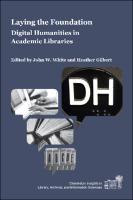Laying the Foundation
Author(s)
White W., John
Gilbert, Heather
Collection
Knowledge Unlatched (KU)Number
103470Language
EnglishAbstract
Laying the Foundation: Digital Humanities in Academic Libraries examines the library’s role in the development, implementation, and instruction of successful digital humanities projects. It pays special attention to the critical role of librarians in building sustainable programs. It also examines how libraries can support the use of digital scholarship tools and techniques in undergraduate education. Academic libraries are nexuses of research and technology; as such, they provide fertile ground for cultivating and curating digital scholarship. However, adding digital humanities to library service models requires a clear understanding of the resources and skills required. Integrating digital scholarship into existing models calls for a reimagining of the roles of libraries and librarians. In many cases, these reimagined roles call for expanded responsibilities, often in the areas of collaborative instruction and digital asset management, and in turn these expanded responsibilities can strain already stretched resources. Laying the Foundation provides practical solutions to the challenges of successfully incorporating digital humanities programs into existing library services. Collectively, its authors argue that librarians are critical resources for teaching digital humanities to undergraduate students and that libraries are essential for publishing, preserving, and making accessible digital scholarship. This title was made Open Access by libraries from around the world through Knowledge Unlatched.
Keywords
media and communications; library and information scienceDOI
10.26530/OAPEN_605454ISBN
9781557537515, 9781557537393Publisher
Purdue University PressPublisher website
http://www.thepress.purdue.edu/Publication date and place
West Lafayette, 2016Grantor
Series
Charleston Insights in Library, Archival, and Information Sciences,Classification
Library and information services


 Download
Download Web Shop
Web Shop